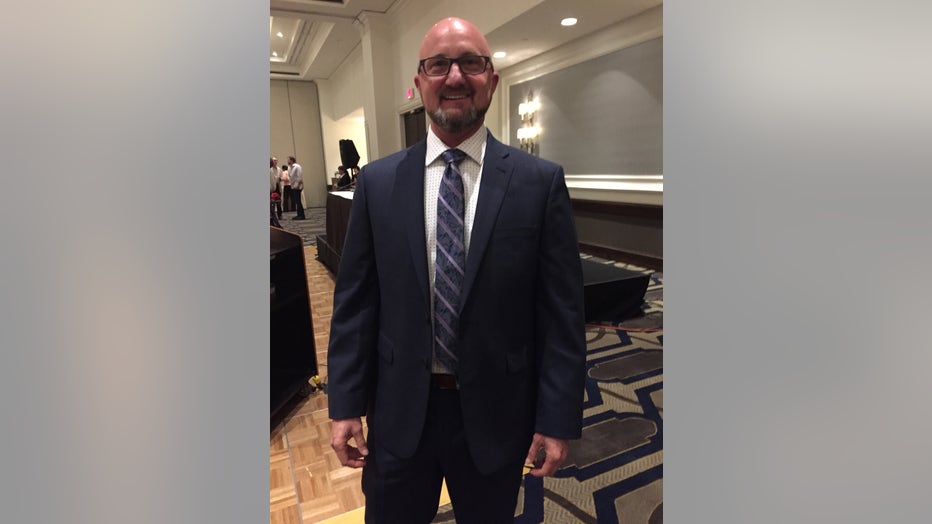Clinical psychologist talks about gender-affirming care
Clinical psychologist talks about gender-affirming care
Dr. Shawn Giammattei is a clinical family psychologist. He is also a gender specialist. A road he did not pursue but one that seemed to find him 20 years ago. Giammattei is trans himself.
SAN FRANCISCO - Dr. Shawn Giammattei, or Dr. Shawn as patients call him, is a clinical family psychologist. He is also a gender specialist. A road he did not pursue but one that seemed to find him 20 years ago.
"A lot of the messaging was kids can't know their gender," he explains, "You know, this there was a lot of that stuff that you're hearing today out there that the clinicians were being taught."
Giammattei says, "I'm trans myself. So the path didn't really make sense to me. And I was actually I was actually somebody who identified my gender at three and didn’t transition until I was 34 because of the time frame within which I was growing up. The so the model that they were giving wasn't making sense."
What did make sense to him was the gender-affirming model. One he says is about following a person’s lead.

Courtesy Dr. Shawn Giammattei
"The gender affirmative model isn't about diagnosing identity at all," says Giammattei, "It's about figuring out what's most authentic for the person in front of you, figuring out if there's incongruence for that person, and then helping deal with the incongruence that's there. And for some kids and adults, that includes gender dysphoria, which is a profound, what I would call existential panic, that what you see when you look in the mirror, what people are mirroring back to you doesn't match what your internal sense of self is. And it's excruciatingly painful. And that's a piece that I don't think I don't think people out there really understand."
However, understanding is critical as the transgender community garners increasing attention from lawmakers. A new study by the Williams institute, a think tank at UCLA's law school estimates that just about 0.5% of all U.S. Adults, and 1.4%, of teens between the ages of 13- and 17 identify as transgender.

Dr. Giammattei at the age of 2
However, according to a site that tracks legislation this year - 45 states have proposed what it calls anti-trans bills, - bills that focus on health care, athletics and identification and schools.
The courts are weighing in; federal judges in Kentucky and Tennessee just blocked portions of transgender youth care bans. And in Arkansas, a federal judge struck down a ban in part citing irreparable harm to those who are denied medical care.
"I think what we were really asking is what happens to a kid when they're denied access to care?" says Giammattei, "And really what happens besides the psychological piece of things, which is that the level of distress and the level it's hard to describe. So we see higher rates of suicidality. We see self-harm, substance abuse, getting themselves in risky situations and trauma and all the rest of that"
In that Arkansas case, U.S. District court judge James Moody also pushed back against arguments of the safety of treatment like puberty blocking hormones saying, "The evidence at trial showed the risks associated with gender-affirming care for adolescents are no greater than the risks associated with many other medical treatments that are not prohibited."
The judge wrote that testimony from teens that received gender-affirming care showed, "This care allowed them to grow from depressed, anxious, and withdrawn young people into happy and healthy teenagers who looked forward to their futures. The state offered no evidence to refute the decades of clinical experience demonstrating the efficacy of gender-affirming medical care."
Dr. Giammattei says, "When puberty does hit for a lot of kids, it can feel like a betrayal. And if they weren't aware earlier, if they were aware where earlier, the idea of impending puberty, it really sends them into a huge state of distress."
When you are talking about distress Dr. Giammattei says parents matter.
Complete Pride coverage from KTVU
According to a 2012 study there was a 4% suicide rate for Trans youth with supportive parents a 57% rate without. 75% without parental support said they suffered from depression versus 23% with support. And 64% of teens with supportive parents saying they had high self-esteem versus 13% who said they were not supported.
"What I find with parents is that they're really scared," explains Dr. Giammattei. "They do not want to send their kid down a path that's wrong. They're afraid they're going to do something that their kid's going to regret and they're going to pay a price for it. And I think the difference is that parents today have a better sense that they might have a kid who's gender diverse, not just playing with gender."
In addition, like any conversation, this one deals with misconceptions about identity and about how difficult his journey can really be.
"There's this idea that somehow people are wanting to turn people into transgender people. In fact, trans people want to turn people into trans people. And that's so far from the truth. It is not an easy life out there to be transgender, especially right now."
"Who would choose to go through all of that?" he asks. "What you have to go through to authentically represent and be able to walk in the world as yourself if it weren't what you really needed to do," he said.

